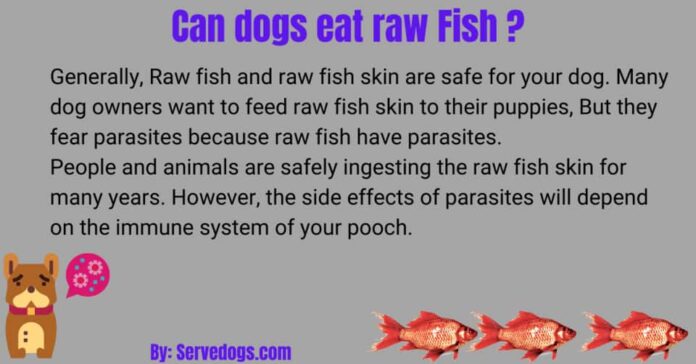Listen up fellow dog parents! If you’ve ever wondered whether it’s okay to toss your pup a fish head you’re not alone. Today, we’re gonna dive deep into everything you need to know about feeding raw fish heads to your four-legged bestie.
The Quick Answer
Yes, dogs can eat raw fish heads, but (and this is a big BUT) there are some super important things you gotta know first! While fish heads can be a nutritious treat, there are risks you need to understand to keep your furry friend safe.
Why Fish Heads Could Be Amazing for Your Dog
Nutritional Benefits
- Omega-3 Fatty Acids
- Supports brain health
- Helps maintain a shiny coat
- Reduces inflammation
- Great for joint health
- Protein Power
- High-quality protein source
- Essential amino acids
- Helps build and maintain muscle
- Other Good Stuff
- Rich in vitamins D and B12
- Contains minerals like zinc and iodine
- Natural source of glucosamine
The Not-So-Fun Risks (Important Stuff!) ⚠️
1. Raw Fish Concerns
Look I’m not trying to scare you. but there are some legit risks with raw fish
- Thiaminase: Some fish contain this enzyme that can break down thiamine (Vitamin B1) in your dog’s body
- Parasites: Raw fish might contain nasty parasites like:
- Flukes
- Roundworms
- Tapeworms
2. Choking Hazards
Fish bones can be super dangerous! They’re like tiny needles that could – Get stuck in your dog’s throat- Puncture internal organs- Cause serious complications
How to Safely Feed Fish Heads to Your Dog
Safe Preparation Tips
- Freezing First
- Freeze raw fish heads for at least 24 hours
- This kills most parasites
- Makes the meat safer to eat
- Remove Those Bones
- Take out as many bones as possible
- Pay special attention to small, sharp bones
- When in doubt, take it out!
- Portion Control
- Start small, especially first time
- Monitor your dog’s reaction
- Don’t overfeed
Best Types of Fish for Dogs
Some fish are better choices than others:
Good Options
- Salmon
- Cod
- Haddock
- Flounder
- Herring
Avoid These
- Tuna (high mercury)
- Swordfish
- King mackerel
- Shark
Signs Your Dog Might Have Issues with Fish
Keep an eye out for these symptoms:- Vomiting- Diarrhea- Lethargy- Loss of appetite- Stomach pain
My Personal Experience (and Tips!)
Y’all, I gotta tell you – my dog Buddy absolutely LOVES fish heads! But lemme share what I’ve learned:
- Start super small
- Watch them like a hawk first time
- Don’t give them fish heads more than 1-2 times a week
- Always supervise when feeding
Alternatives to Raw Fish Heads
Not feeling confident about raw fish? No worries! Try these instead:- Cooked fish (without bones)- Commercial fish-based dog food- Fish oil supplements- Freeze-dried fish treats
The Bottom Line
Feeding your dog raw fish heads can be safe and nutritious IF you:- Take proper precautions- Prepare it correctly- Monitor your dog- Don’t overdo it
Remember, every dog is different! What works for one might not work for another. When in doubt, always chat with your vet first.
FAQ About Dogs and Fish Heads
Q: Can puppies eat fish heads?A: Better wait till they’re older. Puppies have sensitive tummies!
Q: How often can I feed fish heads?A: 1-2 times a week max is plenty.
Q: Should I cook the fish head first?A: You can, but it might reduce some nutrients. If serving raw, freeze first!
Q: My dog swallowed a fish bone! What now?A: Contact your vet ASAP – better safe than sorry!
Final Thoughts
Fish heads can be an awesome addition to your dog’s diet, but they ain’t something to mess around with! Take the proper precautions, and your furry friend might just discover a new favorite treat.
Remember to introduce any new food slowly and always keep an eye on your pup when trying something new. And hey, if you’re not comfortable with raw fish heads, that’s totally fine – there are plenty of other healthy treats out there!
Keep it safe, keep it fun, and happy feeding!
Disclaimer: While this article is based on research and experience, always consult with your veterinarian before making significant changes to your dog’s diet, especially when introducing raw foods.












